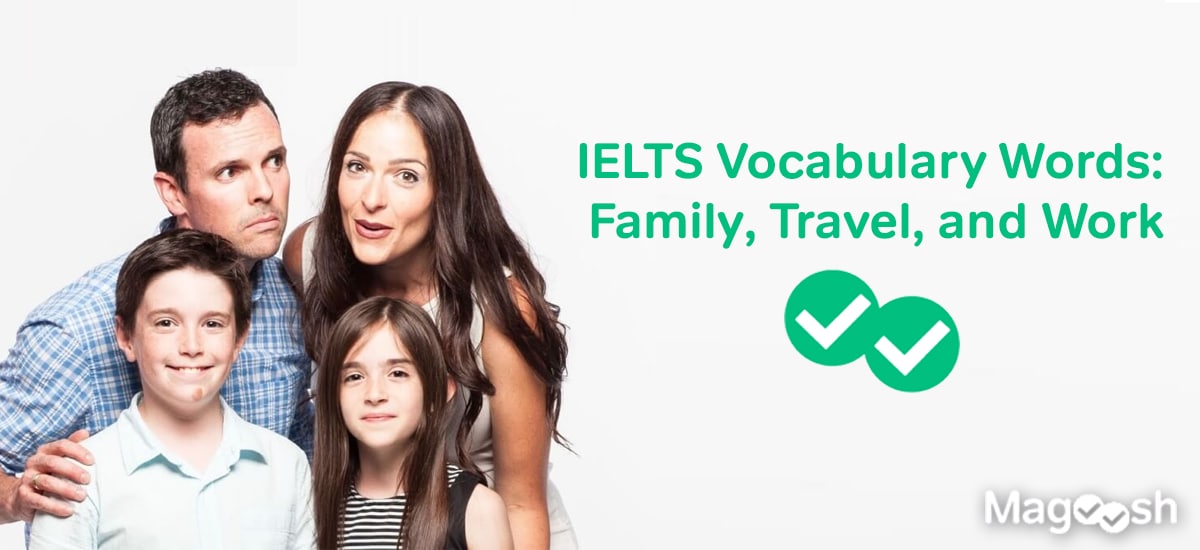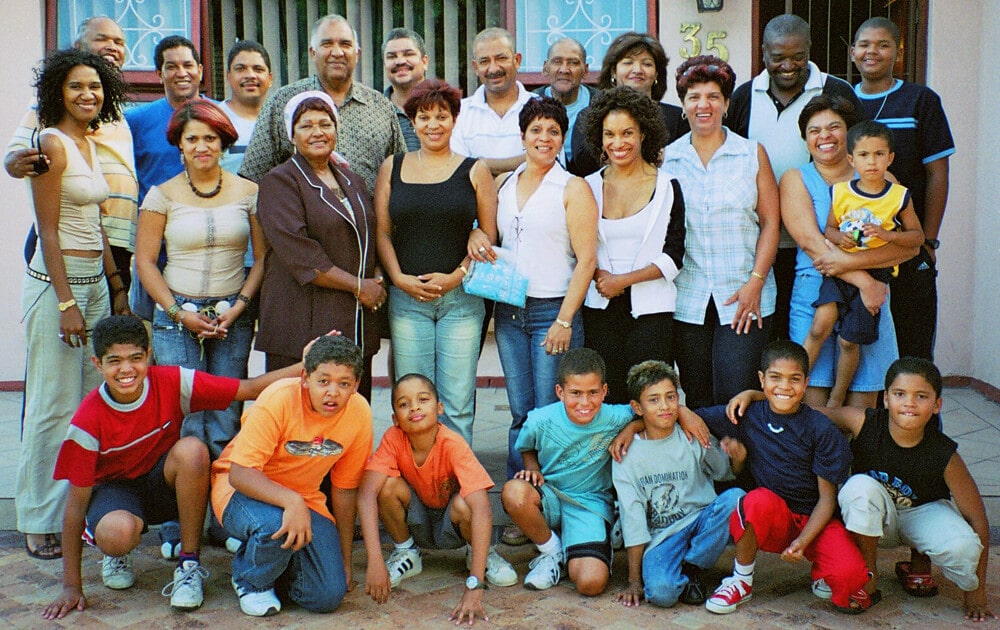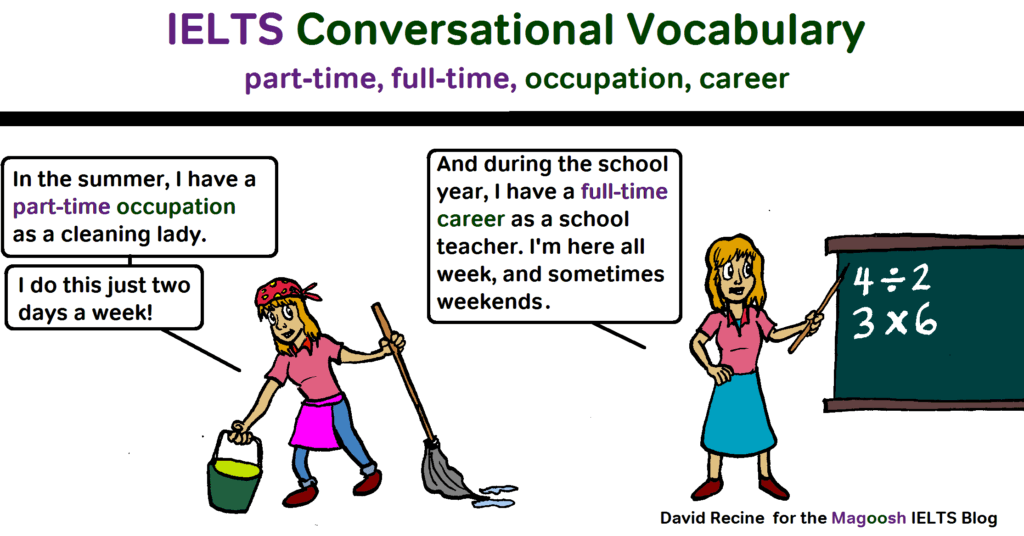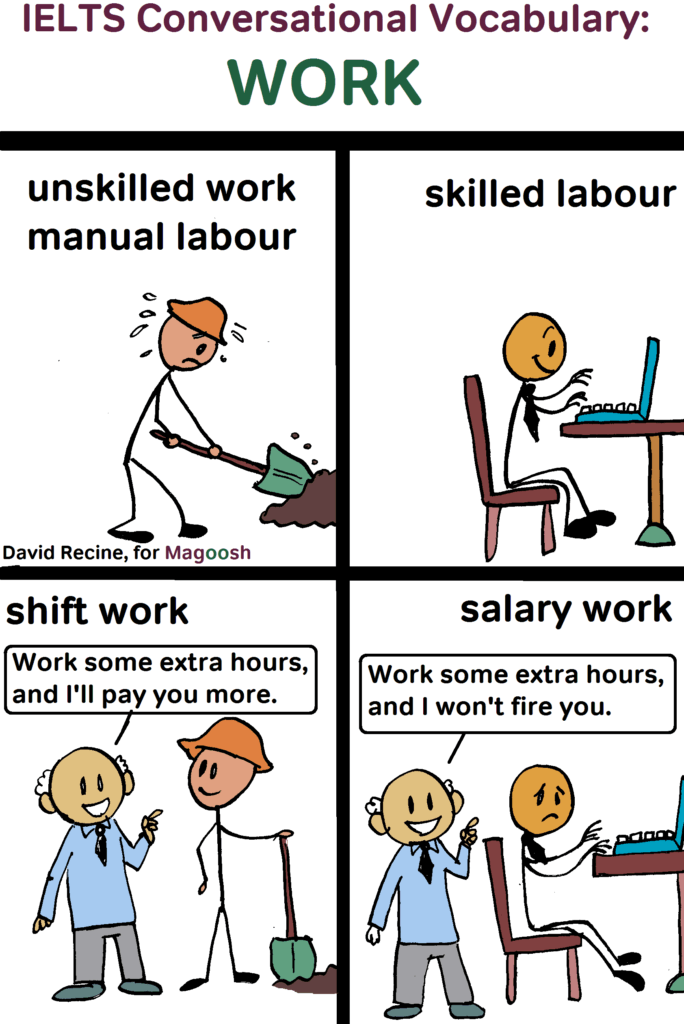Do you know your immediate family from your extended family? What about the difference between a career and an occupation? In this post, we’ll look at vocabulary words for IELTS related to family, travel, and work. Most of these IELTS conversational vocabulary words are important to know for your Speaking and Listening tests, but can also come up in Reading passages.

Table of Contents
- Vocabulary Words for IELTS: Immediate Family
- Vocabulary Words for IELTS: Extended Family
- Vocabulary Words for IELTS: Less Common Family Words
Vocabulary Words for IELTS: Travel
- Accommodation
- Transport
- City centre
- Main square
- Attractions
- High rise
- Storey
- Traditional/quaint
- Character
IELTS Conversational Vocabulary: Family
In the IELTS interview, you will likely be asked about your family. You will hear conversations about family in IELTS Listening as well.
Many English family words are probably already familiar to you. For this post, I’ll assume you already know the words mother, father, son, daughter, brother, sister, grandmother, grandfather, and grandchildren (grandson and granddaughter).
There are a few other family terms you might not know, however. The first two terms we’ll look at are immediate family and extended family.
Your immediate family are the family members in your own household. Your husband or wife and your children would be part of your immediate family. Your parents, brothers and sisters would also be part of your immediate family.
Your grandparents are part of your extended family, and so are many other relatives. Words for extended family relatives can be very different from one language to the next. So there’s a good chance you aren’t familiar with some of the English words for extended family. This post will focus on extended family vocabulary words that might appear on the IELTS. But first, we’ll look at a couple of vocabulary words for immediate family that ESL students often don’t know.
Vocabulary Words for IELTS: Immediate Family

- spouse
- a husband or wife
- sibling
- a brother or sister
- sibling rivalry
- a feeling of competition between siblings (This is a possible topic not just in IELTS Speaking and Listening, but also in the Reading and Writing portions of the exam.)
Vocabulary Words for IELTS: Extended Family

- aunt
- the sister of your father or mother
- uncle
- the brother of your father or mother
- cousin
- the son or daughter of your aunt or uncle
- niece
- the daughter of your brother or sister
- nephew
- the son of your brother or sister
- in-laws
- “In-law” is used to describe the relatives of your husband or wife — that is, the relatives of your spouse. Your spouse’s brother is your brother-in-law, your spouse’s sister is your sister-in-law, your spouse’s mother is your mother-in-law, your spouse’s father is your father-in-law, and so on.
Vocabulary Words for IELTS: Less Common Family Words
The family terms below are unlikely to come up in IELTS Listening tracks or Reading passages. And they are rare in IELTS Speaking and Writing questions. Still, there is at least some chance you’ll see this vocabulary on the exam. And you might use these words in your own responses to IELTS questions.
- step
- Just as “in-laws” are your relatives by current marriage, your “step” relatives are relatives from previous marriages. For example, if a man marries a woman who already has children, he becomes their step father, and they become his step children. And if both a husband and wife have children from their previous marriages, those children become each others’ step siblings.
- great grandparents (great grandmother and great grandfather)
- the parents of your grandparents
- great grandchildren
- the children of your grandchildren
IELTS Conversational Vocabulary: Travel and Places

Travel and places are popular conversation topics on the IELTS, both on the interview-style IELTS Speaking test, and on the audio tracks in IELTS Listening.
Accommodation
On the IELTS, “accommodation” has two meanings. It can mean the place where you live. This use is especially likely to come up in IELTS Speaking, where you may be asked to describe the accommodation you live in. In travel conversations, often heard on IELTS Speaking audio tracks, “accommodation” refers to the places people stay while they are travelling, places such as hotels, inns, and hostels.
Transport
“Transport” refers to the way that people move from one place to another if they aren’t walking. In IELTS conversations, there will be talk about long distance transport, such as trains and airplanes taken to holiday destinations. There will also be discussion of transport within a town or neighbourhood, such as the use of a car, bicycle, scooter, or bus to get to work, school, or the supermarket.
City centre
The city centre is the business district found in the middle of a city. Sometimes this centre is also referred to as “downtown.”
Main square
The “main square” is the small, most central area of a city centre, or of a business district outside of the city centre. Examples of famous main squares around the world include Times Square in New York City and Tiananmen Square in Beijing.
Attractions
In IELTS conversations about travel and places, “attractions” refers to tourist attractions, interesting places that travelers like to visit.
High rise
A “high rise” is a very tall building, often seen in a city centre. High rise buildings are especially common in and around the main square of a city centre.
Storey
A “storey” is a single level of a building, and is also sometimess called a “floor.” A high rise building generally has more than 10 storeys, and may have dozens of storeys, more than a hundred storeys in extreme cases. In IELTS conversations, people also may talk about the number of storeys in their personal accommodation, with phrases such as “two storey home” or “a flat in a 12 storey building.”
Traditional/quaint
The words “traditional” and “quaint” are both used on the IELTS to describe towns, neighbourhoods, houses, and other locations that look “old fashioned.” A place is traditional or quaint if its characteristics are associated with a past time period.
Character
A home, community, town, or location is said to have “character” if it is an interesting place that is different from other places. This word has a positive connotation — a positive feeling or sense. If a place has character, it is special in an enjoyable way.
IELTS Conversational Vocabulary: Work
Many conversations that you’ll have in IELTS Speaking or hear in IELTS Listening will focus on work. Here are a few key vocabulary words for IELTS about jobs.
Part-time/Full-time
These terms refer to the amount of time you spend at a job. A part-time job is usually worked less than 30 hours a week, and a full-time job is usually worked at least 30 hours a week. On the IELTS, full-time most often refers to a job that’s scheduled for 40 hours a week.
Occupation
An occupation is a specific job position you hold. Examples of occupations include firefighter, police officer, teacher, restaurant manager, postal worker, cook, janitor, and so on.
Career
“Career” is a more broad term than “occupation.” It refers to the category of work someone does, and suggests a long-term commitment. To help you understand the difference between occupation and career, I will tell you about my career and the occupations I’ve had in it. I have a career as an educator. My current occupation in this career is a Test Expert position here at Magoosh. As a part-time occupation, I am also a language tutor. And earlier in my education career, I was occupied (the verb form of occupation) as a middle school teacher, and then as a university professor.

Shift work
“Shift work” refers to work that is scheduled with a specific beginning and ending time. A shift at a workplace often lasts eight hours, but can be shorter. Shift work is usually paid on an hourly basis.
Salary work
Salary work may have an expected schedule, a shift where the worker will normally be at work. But the schedule and hours per day for salary work are not as strictly controlled. A salary worker may have to work much longer hours than usual on a given day, or come in on the weekends. Sometimes, however, a salary worker’s situation is the opposite. A salary worker may also work shorter hours and have more freedom to leave the workplace during their normally scheduled shifts. Salary workers aren’t paid by the hour and instead receive a fixed rate of pay per week or month.
Unskilled/Skilled
Unskilled work is work that requires little or no training, such as fry cook work at a fast food restaurant, or work cleaning and maintaining buildings. Skilled work does require training. Some workers are so highly skilled that they have doctoral degrees — lawyers and doctors for examples. Other skilled occupations require less training. Skilled work as a plumber, computer programmer, or automotive repairman may only require a four-year degree, a two-year degree, or an even shorter certification.
Manual labour
“Manual labour” refers to work that is very physical, requiring a lot of strength and physical activity. Manual labour jobs include unskilled work such as stocking shelves at a grocery store, and skilled work such as welding.
The comic strip below gives these IELTS conversational vocabulary words context, so you can better remember them.

Where can I find more IELTS conversational vocabulary words?
We hope you found this list of IELTS conversational vocabulary helpful! For more resources, check out our Complete Guide to IELTS Vocabulary.





